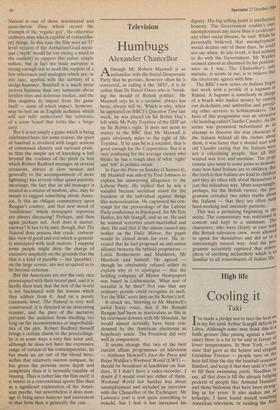Television
Humbugs
Alexander Chancellor
Although Mr Robert Maxwell is so unfamiliar with the Social Democratic Party that he persists, however often he is corrected, in calling it the 'SPD', it is he rather than Dr David Owen who is 'break- ing the mould of British politics'. Mr Maxwell says he is a socialist; always has been; always will be. Which is why, when he appeared on BBC1's Question Time last week, he was placed on Sir Robin Day's left while Ms Polly Toynbee of the SDP sat on Sir Robin's right. It does not seem to matter to the BBC that Mr Maxwell is quite obviously miles to the right of Ms Toynbee. If he says he is a socialist, that is good enough for the Corporation. But it is very confusing for the average viewer who thinks he has a rough idea of what 'right' and 'left' in politics mean.
In Face the Press on Sunday (Channel 4), Mr Maxwell was asked by Paul Johnson to explain his unswerving allegiance to the Labour Party. He replied that he was a socialist because socialism stood for the freedom of the individual against things like nationalisation. He expressed his con- tempt for the proceedings of the Labour Party conference in Blackpool, for Mr Eric Heffer, for Mr Scargill, and so on. He said he wanted terrorists court-martialled and shot. He said that if the unions caused any bother on the Daily Mirror, the paper would be closed down for ever. He re- vealed that he had proposed an anti-union alliance between the tabloid proprietors Lords Rothermere and Matthews, Mr Murdoch and himself. He agreed though he obstinately refused either to explain why or to apologise — that the holding company of Mirror Newspapers was based in Lichtenstein. What sort of socialist is he then? Not one that any ordinary person could recognise as such. Yet the BBC seats him on Sir Robin's left.
It struck me, listening to Mr Maxwell's awful fruity voice, that if Mr Ronald Reagan had been as inarticulate as this in his television debates with Mr Mondale, he would almost certainly have been con- demned by the American electorate as hopelessly senile. The President did very well in comparison.
It seems strange that two of the best current affairs programmes on television — Anthony Howard's Face the Press and Brian Walden's Weekend World (LWT) should be broadcast at lunchtime on Sun- days. If I didn't have a video-recorder, I doubt if I would ever see either of them. Weekend World last Sunday was about unemployment and included an interview with the Chancellor of the Exchequer. Mr Lawson's jowl is now quite something to behold, but I feel it has increased his dignity. His big selling point is intellectual honesty. The Government couldn't cure unemployment any more than it could cure any other social disease, he said. While he personally believed that unemployment would decline one of these days, he could not say when. In any event, it had nothing to do with the Government. Mr Walden seemed almost as disarmed by his perform- ance as I was. The Chancellor's only mistake, it seems to me, is to believe that the electorate agrees with him. The BBC's new series on Italians began last week with a profile of a bagnino In Rimini. A bagnino is somebody in charge of a beach who makes money by renting out deckchairs and umbrellas and provid- ing other services to holidaymakers. The hero of this programme was an attractive • old humbug called Claudio Casadei. As the series was promoted beforehand as an attempt to discover the true character of the Italians behind all the clichés about them, it was funny that it should start with old Claudio saying that the Italians were not a calculating people, that all they wanted was love and sunshine. The Prot' ramme also went to some pains to demons- trate how kind Italians are to children. But the truth is that Italians are kind to children and they do often talk about themselves in just this ridiculous way. More surprisinglY' perhaps, for the British viewer, the PO" gramme revealed two other truths about the Italians — that they are often both hard-working and intensely patriotic. This was a promising beginning to the series. The commentary was restrained In content and kept to a minimum. The characters, who were clearly at ease with this British television crew, were allowed to speak for themselves and did so in a convincingly natural way. And the pro- gramme accurately captured that atmos- phere of soothing melancholy which is s° familiar to all connoisseurs of Italian life.


















































 Previous page
Previous page